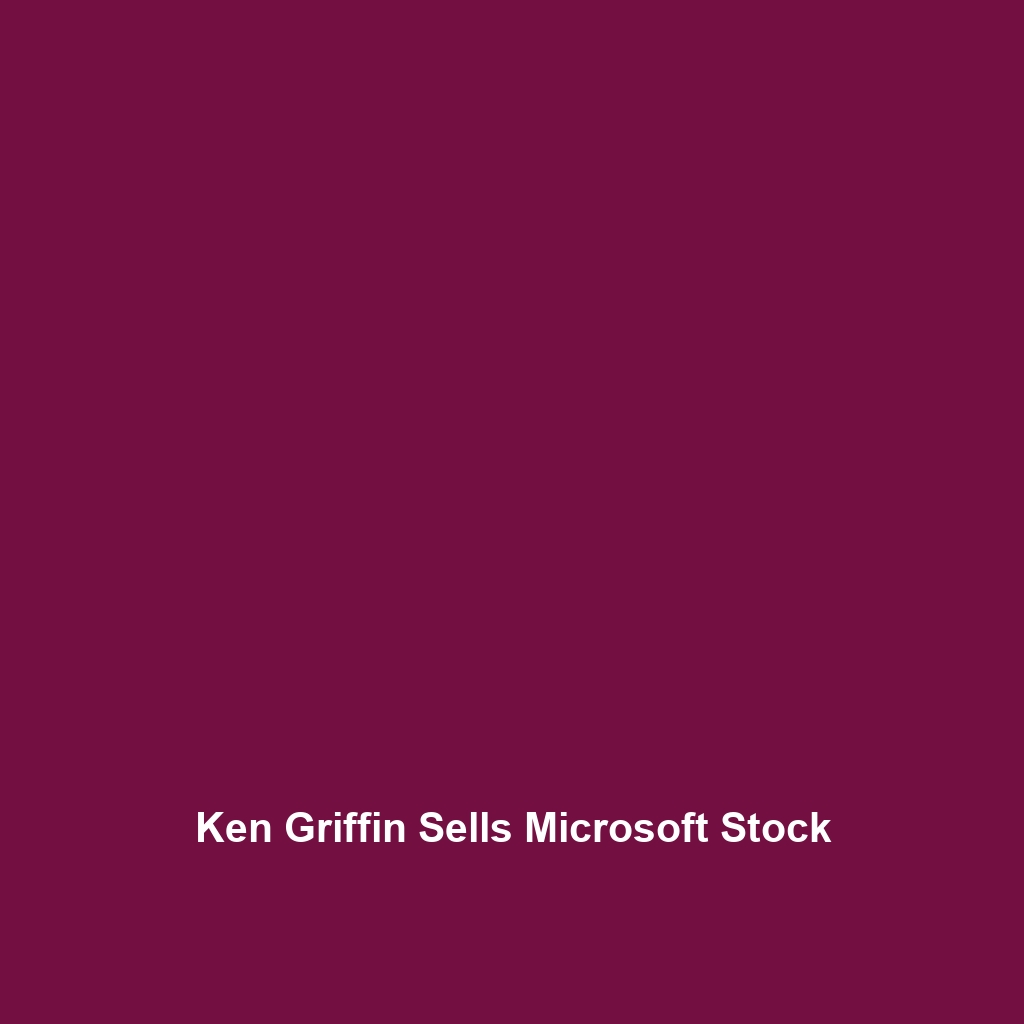Your cart is currently empty!
Tag: capital allocation

Ken Griffin Sells Microsoft Stock
Ken Griffin Sells Microsoft Stock
Ken Griffin Sells Microsoft Stock
In a notable move that has captured the attention of Wall Street, Ken Griffin, the billionaire founder and CEO of Citadel, sold approximately $750 million worth of Microsoft shares this month. The sale has ignited speculation regarding Griffin’s investment strategy and the future positioning of one of the largest investment firms in the world.
Details of the Sale
The liquidation of Microsoft shares, which Griffin reportedly began executing in the third quarter of 2023, has prompted market analysts to reassess broader tech sector trends. This transaction, confirmed by regulatory filings, is seen as both a personal financial decision and a reflection of Griffin’s vision for Citadel’s investment portfolio.
As of late September 2023, Citadel was one of the largest institutional holders of Microsoft, a position that has now shifted due to this significant divestment. The shares in question represented a notable percentage of Griffin’s total stake in the tech giant, which has been a principal driver of economic growth in recent years.
Market Reactions and Speculations
The revelation of Griffin’s sale has elicited varied reactions from market observers. Some analysts suggest that this could be a sign of a bearish outlook on the technology market amidst rising interest rates and broader economic uncertainties. Others, however, argue that Griffin’s decision is more tactical than indicative of an overall downturn, potentially freeing up capital for new investment opportunities.
“Investors often take profits at strategic moments, and this could simply be Griffin rebalancing his portfolio,” stated Mark Luschini, chief investment strategist at Janney Montgomery Scott. “It doesn’t necessarily mean he lacks faith in Microsoft or the tech sector.”
Historical Context of Griffin’s Investments
Griffin’s trading history shows a pattern of adapting his investments in line with market conditions. Citadel has traditionally been focused on both equity and alternative investments, which allows for flexibility amid changing market dynamics. In the first half of 2023, Citadel had made substantial investments in a range of sectors, but Griffin’s shift away from tech stocks signals a possible pivot.
Moreover, this sale comes in the backdrop of Microsoft’s strong performance in the stock market. The company’s share price has seen substantial growth over the past few years, driven by strong demand for cloud computing and artificial intelligence services. Analysts note that Griffin’s decision to sell such a significant portion could be driven by a desire to lock in profits before potential market corrections.
Implications for the Tech Sector
The outcome of Griffin’s stock sale extends beyond Citadel’s financial architecture, with implications for the tech sector as a whole. Market analysts are closely monitoring investor sentiment following this significant action, as it may influence other institutional investors contemplating similar moves. A large-scale withdrawal from tech stocks could lead to increased volatility in the sector.
Additionally, Griffin’s actions could trigger a psychological response among retail investors. Concerns about large investors pulling back from tech shares may lead to a cascade effect, with smaller investors reacting to perceived risks within the industry.
Expert Opinions on the Future
Economists and market analysts emphasize the importance of discerning underlying motives behind such high-profile sales. Robert R. Johnson, a finance professor at Creighton University, opined, “A sale of this magnitude often signals a change in strategy, whether it is risk management or anticipation of market shifts. It is not uncommon for major players to recalibrate their positions.”
Given Griffin’s reputation as a savvy investor, observers suggest that this behavior might hint at a potential downturn in tech valuations or the readiness to pivot towards more defensive sectors. “While Microsoft has solid fundamentals, the broader tech landscape is fraught with uncertainty, which may be influencing Griffin’s decisions,” added Johnson.
Conclusion
Ken Griffin’s recent divestment of $750 million in Microsoft shares has introduced a wave of speculation regarding the future of his investment strategy and the overall trajectory of tech stocks. With macroeconomic factors and interest rate hikes looming, investors are closely observing Citadel’s next moves.
While Griffin’s motives remain speculative, his actions serve as a reminder of the fluidity within the financial markets, especially in sectors as volatile as technology. Future trends will likely emerge in the coming quarters, requiring investors to stay vigilant amid ongoing economic fluctuations.
For more insights on investment strategies and market analysis, follow our coverage.
